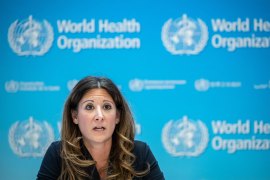N.J. Superior Court Judge Rules Atlantic City’s Needle-Exchange Program Not Allowed Under State Law
New Jersey Superior Court Judge Valerie Armstrong on Wednesday ruled that Atlantic City, N.J., does not have the authority to create a needle-exchange program to help prevent the spread of diseases, including HIV and hepatitis, among injection drug users, the AP/Philadelphia Inquirer reports (AP/Philadelphia Inquirer, 9/2). The Atlantic City City Council in June approved 7-1 a proposal to implement a needle-exchange program, although the New Jersey Office of the Attorney General in May said that the proposed program did not have the legal authority to operate. Atlantic City Health and Human Services Director Ron Cash said that the city's authority to begin such a program was based on a 1999 amendment that exempts government agencies from a section of state law that criminalizes needle and syringe possession, but state Attorney General Peter Harvey (D) reviewed the law and determined that it allows government agencies to distribute needles and syringes only to people with prescriptions. Atlantic County Prosecutor Jeffrey Blitz later filed a lawsuit to halt the implementation of the state's first needle-exchange program. Blitz in a four-page civil suit said that the program would violate state law and requested that Atlantic City be prohibited from moving forward with the program (Kaiser Daily HIV/AIDS Report, 9/1).
Ruling Details, Reaction
Armstrong in a 29-page ruling wrote that her decision was not an evaluation of the program's viability as a public policy but a determination of its conformity to state law. "It is abundantly clear that the ordinance permits what is expressly forbidden by (state law) ... the distribution of hypodermic syringes by a municipality to persons not authorized to possess them, namely intravenous users of illegal drugs," Armstrong wrote. Atlantic City will appeal the decision, Robert Sandman, one of the city's attorneys, said. Armstrong's decision was "fully anticipated," Blitz said, adding, "We advised the city early on they had exceeded their authority" (Livio, Newark Star-Ledger, 9/2). He added that the county would contest an appeal filed by the city(AP/Philadelphia Inquirer, 9/2). "[T]oday's decision increases my resolve to have this matter considered by the Legislature as soon as possible," state Assembly Majority Leader Joseph Roberts (D) said in a statement (Puga, Cherry Hill Courier-Post, 9/2). The ruling "is going to be a disappointment to everyone in Atlantic City who worked so hard for this. ... This squarely puts the ball in the Legislature's and the governor's court," Roseanne Scotti, director of the Drug Policy Alliance of New Jersey, said.
Camden Ordinance, Possible Legislation
Armstrong's ruling follows the proposal of a needle-exchange ordinance by the city council in Camden, N.J., where officials were awaiting the outcome of Atlantic City's appeal before moving forward to establish their own program, the Star-Ledger reports. "We will put our heads together and join with them in their appeal," Camden City Council member Ali Sloan-El said (Newark Star-Ledger, 9/2). In addition, state Health Commissioner Clifton Lacy announced on Tuesday that New Jersey Gov. James McGreevey (D) plans to ask state legislators to amend state law to allow needle-exchange programs to prevent the spread of HIV. McGreevey has said he would like to make needle-exchange programs legal in New Jersey before his Nov. 15 resignation. Lacy recently met with Roberts and state Sens. Joseph Vitale (D) and Nia Gill (D) to discuss the bill, which would allow cities and other jurisdictions to establish and operate needle-exchange programs, but the bill would not allow nonprescription pharmacy sales of syringes (Kaiser Daily HIV/AIDS Report, 9/1). "Now that we have Assemblyman Roberts and the governor, we will see improvement (in state laws regarding needle exchange)," Atlantic City City Council President Angel Fuentes said (Cherry Hill Courier-Post, 9/2). Needle-exchange programs are "a very unhealthy and risky government policy," John Tomicki, executive director of the League of American Families, said, adding, "I sincerely doubt there is support within the Legislature to pass such a controversial and unhealthy program." Roberts said that a bill could be drafted by the end of next week (Newark Star-Ledger, 9/2).
Star-Ledger Editorial
McGreevey and incoming acting Gov. Richard Codey (D) -- who will take office when McGreevey resigns -- "should do all they can to make sure that legislation [allowing needle-exchange programs] is prepared quickly and then push hard for its passage," a Newark Star-Ledger editorial says. Although needle-exchange programs "aren't a public health panacea," they help "reduce the rate of [HIV] infection and save lives," the editorial says, adding, "Both are inarguable goals." Studies "overwhelmingly" show that needle-exchange programs help prevent HIV transmission among injection drug users, do not increase drug use, are an important source of referral for drug treatment programs and cost less than treatment for HIV/AIDS, the Star-Ledger says. In New Jersey, which ranks fifth in HIV/AIDS prevalence nationwide, McGreevey's initiative to pass legislation that would allow clean needles to be provided to drug users "is a worthy one that should be taken up by the incoming administration," the editorial concludes (Newark Star-Ledger, 9/2).






